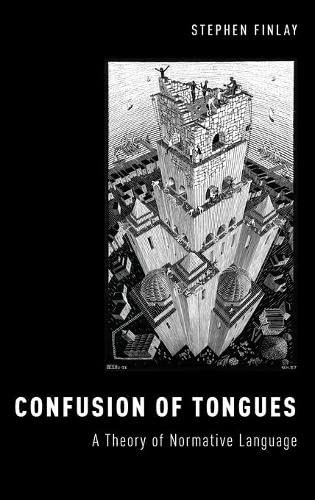All books / Book
Confusion of Tongues: A Theory of Normative Language (Oxford Moral Theory)

| Full title: | Confusion of Tongues: A Theory of Normative Language (Oxford Moral Theory) |
|---|---|
| ISBN: | 9780199347490 |
| ISBN 10: | 0199347492 |
| Authors: | Finlay, Stephen |
| Publisher: | Oxford University Press |
| Edition: | Illustrated |
| Num. pages: | 288 |
| Binding: | Hardcover |
| Language: | en |
| Published on: | 2014 |
Read the reviews and/or buy it on Amazon.com
Synopsis
Can Normative Words Like Good, Ought, And Reason Be Defined In Entirely Non-normative Terms? Confusion Of Tongues Argues That They Can, Advancing A New End-relational Theory Of The Meaning Of This Language As Providing The Best Explanation Of The Many Different Ways It Is Ordinarily Used. Philosophers Widely Maintain That Analyzing Normative Language As Describing Facts About Relations Cannot Account For Special Features Of Particularly Moral And Deliberative Uses Of Normative Language, But Stephen Finlay Argues That The End-relational Theory Systematically Explains These On The Basis Of A Single Fundamental Principle Of Conversational Pragmatics. These Challenges Comprise The Central Problems Of Metaethics, Including The Connection Between Normative Judgment And Motivation, The Categorical Character Of Morality, The Nature Of Intrinsic Value, And The Possibility Of Normative Disagreement. Finlay's Linguistic Analysis Has Deep Implications For The Metaphysics, Epistemology, And Psychology Of Morality, As Well As For The Nature And Possibility Of Normative Ethical Theory. Most Significantly It Supplies A Nuanced Answer To The Ancient Euthyphro Question Of Whether We Desire Things Because We Judge Them Good, Or Vice Versa. Normative Speech And Thought May Ultimately Be Just A Manifestation Of Our Nature As Intelligent Animals Motivated By Contingent Desires For Various Conflicting Ends-- Machine Generated Contents Note: -- Chapter 1. Introduction -- Chapter 2. A Good Word To Start With -- Chapter 3. The Probable Meaning Of 'ought' -- Chapter 4. Explaining Reasons -- Chapter 5. Pragmatics And Practicality -- Chapter 6. Multiple Ends -- Chapter 7. Categorical And Final -- Chapter 8. A Disagreeable Problem -- Chapter 9. Conclusion. Stephen Finlay. Includes Bibliographical References (pages 259-271) And Index.